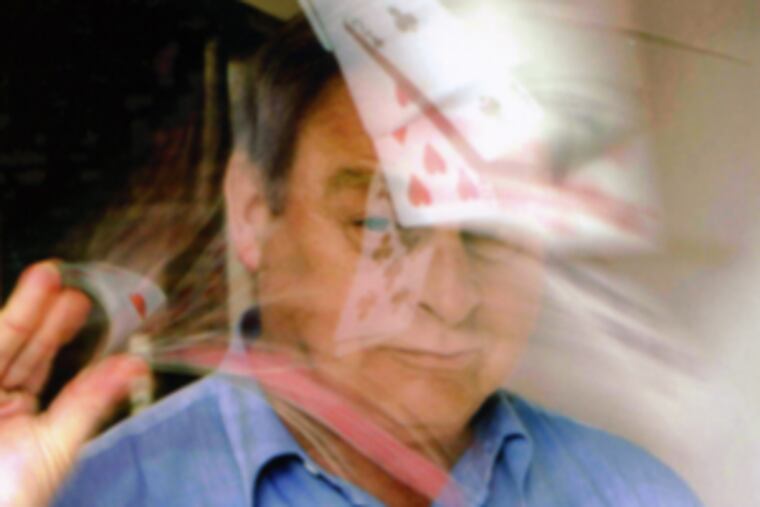The sequel to hitting the poker-book jackpot
You've got to like Anthony Holden. Polymath smart, funny, self-effacing. Where most poker players would keep you up all night trying to take your money, Holden would rather invite you to dinner and discuss Aeschylus.

A Year Inside The Poker Boom
By Anthony Holden
Simon & Schuster. 291 pp. $26
nolead ends nolead begins
Reviewed by Rathe Miller
You've got to like Anthony Holden. Polymath smart, funny, self-effacing. Where most poker players would keep you up all night trying to take your money, Holden would rather invite you to dinner and discuss Aeschylus.
Well, maybe that's because he's not just a poker player. Biographer, translator, journalist, Holden loves poker, but he also loves - as he quotes Shakespeare, on whom he has written three books - "the world out there."
For Holden's poker, this is a bad thing. For the reader of Bigger Deal, this is a good thing.
Not only do we get a first-class seat on a tour of the "new poker" - the Internet-TV-mega-million-dollar-tournament phenomenon of the last few years - we get to take it with a tour guide who puts it in the context of the human condition.
In Vienna, he "eschews" playing in the Austrian Open to take the "Third Man Tour" with his son. In Vegas, he visits the art gallery at the Bellagio and marvels at Van Gogh's "great clomps of paint, tortured into agonized swirls." He returns to the tables, infused with the "crazed creator's" confidence to take huge risks.
This is not your typical Texas road-game, backroom-poker-player narrative of yore.
But we knew that in 1990, when Holden published Big Deal, the first account of his adventures on the green baize. Back then, he dedicated one year to discover if he had what it took to be a pro. He did not. But he did write one of the all-time great poker books in the process.
For this sequel, the conceit is a year traveling to poker tournaments and working on his game with the goal of winning the big one - the World Series of Poker - at which the book begins with his play in 2005 and ends with his play in 2006. That, during this year, he doesn't even quit his day job - as music critic for the Observer - is an indication of his level of dedication this time around.
Of course, he finishes out of the money. But the point really never was to win the WSOP. It was to write another great poker book. (And perhaps to cash in on the poker boom?)
Big Deal became an instant classic, has never been out of print, and made Holden a celebrity in the poker world.
But let's lay our cards on the table: Bigger Deal is the lesser book - without the narrative thread, dramatic tension or raw energy of its predecessor. At times, it reads more like a series of magazine articles than a memoir. At its worst - the chapter on the World Cup tournament in Barcelona - the deadly detail of which country had how many points at what level will challenge even the most dedicated pokerista.
That being said, Bigger Deal still goes on the top shelf of the ever-expanding bookcase of poker narratives along with just a few of the other recent entries, including James McManus' Positively Fifth Street and Peter Alson's Take Me to The River.
Bigger Deal is marbled with age, loss and nostalgia. Sad, perhaps, for Holden, but, again, not necessarily bad for the reader. Pushing 60 and "feeling older than my years," he acknowledges his beloved "Tuesday night game" with his best buddies is defunct. He crosses Fremont Street outside Binion's casino. where he hung with the likes of owner Benny Binion and legendary players Johnny Moss and Stu Unger - all now dead - and is "awash with memories."
But after 40 years of playing and writing about it, he knows the poker world and almost everybody in it.
We meet players Doyle Brunson, Howard Lederer and Annie Duke. And the people behind the boom, like Steve Lipscomb, creator of the World Poker Tour, and Henry Orenstein, inventor of the tiny camera that made poker a TV commodity.
Holden casts his critic's gimlet eye on all. Foxwoods casino in Connecticut is an "act of architectural vandalism." Atlantic City players are "like the town they inhabit, just awful." In Vegas he shudders at "the amorphous mass of degenerate humanity seething across your path in search of new excitement, new thrills, new ways to lose money."
And his beloved game, where everything from the pocket cams to the chip counts are now sponsored by beer and motor oil? With dismay he watches "its descent into corporate capitalism . . . the debasement of the game I have so long loved . . . the rampant vulgarization of poker."
In Vegas he witnesses an electronic table - no dealer, no cards, no chips. "I have seen the future and it sucks."
"But it's still the best game on earth," writes Holden. "Deal me in."